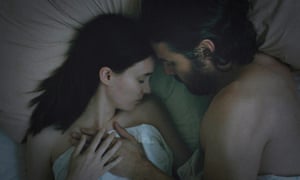C (Casey Affleck) and M (Rooney Mara) are a happy couple who live a nice suburban lifestyle until tragedy strikes. C dies in an accident and comes back as a man in a sheet with cut-out eyes. Or, a ghost. It's an eccentric idea from Lowery that in the wrong hands could have been disastrous. Yet, it takes the ghost mythology and flips it on its head so that we're seeing things from the ghost's point of view in a bizarrely, almost Pixar-esque way with a real tenderness and encumbrance. So superbly executed, in fact, that it is achingly sad rather than nonsensical. Commendation has to go to Affleck, who, in a sheet is a sad, forlorn figure that shows more emotion than many a leading man gone by have. The role is reminiscent to Michael Fassbender's role in Frank, which is high praise indeed.
 The crux of the film comes down to Lowery's circumspection with his own material. His meticulousness to Malickian long-takes and long stretches without dialogue will make this film polarising but its absolute fascinating direction is worthy of academic study, for sure. An example of this is a five minute long-take of M after she's come back from the hospital. Lowery sets up a mid-shot with M on the floor and a deceased C lingering over her, passively watching. M engorges a pie ferociously in a desperate attempt to feel any sort of emotion after losing her partner to the point that she runs off to the toilet to throw it all back up. This is the pinnacle of Lowery's direction. It supplies the film with an even more voyeuristic view than normal which makes the audience feel trepidation and a hammering of guilt that never quite goes away. The audience is exactly the same as C's ghost, we're watching a woman in severe pain yet we can do nothing. At times it makes for a very uncomfortable, even harrowing, viewing as we're forced to watch a woman go to extreme lengths to feel anything. Its portrayal of grief is nothing short of superb.
The crux of the film comes down to Lowery's circumspection with his own material. His meticulousness to Malickian long-takes and long stretches without dialogue will make this film polarising but its absolute fascinating direction is worthy of academic study, for sure. An example of this is a five minute long-take of M after she's come back from the hospital. Lowery sets up a mid-shot with M on the floor and a deceased C lingering over her, passively watching. M engorges a pie ferociously in a desperate attempt to feel any sort of emotion after losing her partner to the point that she runs off to the toilet to throw it all back up. This is the pinnacle of Lowery's direction. It supplies the film with an even more voyeuristic view than normal which makes the audience feel trepidation and a hammering of guilt that never quite goes away. The audience is exactly the same as C's ghost, we're watching a woman in severe pain yet we can do nothing. At times it makes for a very uncomfortable, even harrowing, viewing as we're forced to watch a woman go to extreme lengths to feel anything. Its portrayal of grief is nothing short of superb.The distressing, espial nature of A Ghost Story is further propelled by Lowery's use of 1:33 aspect ratio. This expedites the claustrophobic, boxed-in nature of Lowery's picture: you can't leave, even if you really want to. There's no escape from the enduring pain of time, which is one of the inescapably dense themes. For a 92 minute piece it covers a lot of ground, yet seems to execute every single ingenious idea it throws out there.
The idea of life after death is, of course, an important issue that Lowery tackles but he tackles them through the use of two others: legacy and time. Exactly why does anything matter and will anyone remember me? Lowery bombards us with. Casey Affleck's character is a musician and we (cleverly) never know how successful he is, but Lowery is questioning all art here, and his love and passion for art and why it matters. In many ways, A Ghost Story is about why being creative matters and why art is important. For a film that spans generations it's a very relevant film to now.

Yet Lowery doesn't explore the now, because, well, there doesn't seem to be a now. The film clearly travels through a fair amount of time, but at the same time Lowery shows time as a void, an abyss that you can't escape. We don't know how long Rooney Mara's character stays in the house before moving on, in fact we don't even know if she ever does but Lowery explores time as if it is linked inherently to legacy. The scene that ties the film narratively is Will Oldham's excellent cameo as a philosophical know-it-all that states that everyone is going to die and nothing will ever matter. It's a powerful monologue that turns A Ghost Story from a set of increasingly complex ideas into a fully-fledged masterpiece of oeuvre cinema.
In short, Lowery has created an elegiac, cyclical film that will certainly grow on repeat viewings. Not that you'll need it, A Ghost Story is so cinematically dominant, so thematically murky that it will stay with you for weeks.

No comments:
Post a Comment